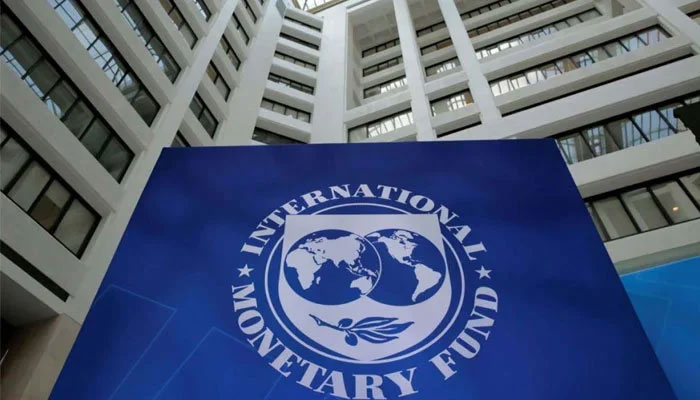Comment :New finance minister must think beyond IMF
The IMF has one-size-fits-all solutions. These solutions always revolve around measures such as tax hikes
The new finance minister must not pin all hopes on the IMF. The new finance minister must reassess Pakistan’s relationship with the IMF. The new finance minister must recognize that the IMF is not a benevolent entity tasked with solving Pakistan’s economic woes.
The IMF’s primary function, as outlined in its Articles of Agreement, is the promotion of international monetary cooperation -- not resolution of Pakistan’s economic issues. The new finance minister must not expect the IMF to provide sustainable solutions for our economic problems.
The IMF has one-size-fits-all solutions. These solutions always revolve around measures such as tax hikes, tariff increases on essential services like electricity, and stringent austerity measures imposed on the government. Despite Pakistan’s long history of engagement with the IMF, spanning 74 years and encompassing 24 different ‘arrangements,’ the effectiveness of these programs has been questionable. Instead of yielding sustainable outcomes, our recurrent reliance on IMF loans has perpetuated a cycle of debt, wherein new loans are sought primarily to service existing ones, rather than fostering genuine economic progress.
The IMF’s 78-year history is marked by interventions that helped member states navigate economic crises. To be certain, these interventions have never ever fostered long-term economic robustness. Here are a few countries where IMF programs have unequivocally failed: Argentina, Zimbabwe, Greece, Ecuador, Ukraine, Venezuela, Nigeria and Jamaica. Yes, the IMF provides valuable support, the new finance minister must recognize that lasting solutions can only come out of homegrown economic strategies.
Pakistan’s economic future hinges on the new finance minister’s ability to champion homegrown solutions tailored to our specific challenges. Here are five key areas for focus: (1) Resolving energy-sector Inefficiencies; (2) Privatization of State-Owned Enterprises; (3) Enhancing agricultural productivity; (4) Boosting the IT and knowledge economy; and (5) Deregulation, reducing red tape and business environment reforms.
The new finance minister must end blind reliance on external solutions. Pakistan’s economic destiny lies in the hands of its own leadership. The new finance minister must forge a new path. By implementing these homegrown solutions – from tackling energy inefficiencies to fostering innovation – the new finance minister can break the cycle of debt and usher in a new era of sustainable prosperity
This bold approach demands courage and vision, but the reward is a future where Pakistan charts its course to economic success. Let us rise to the challenge and build an economy as resilient and dynamic as the Pakistani spirit itself.
-
 Prince Harry Reacts As Beatrice, Eugenie's Names Surface In Epstein Emails
Prince Harry Reacts As Beatrice, Eugenie's Names Surface In Epstein Emails -
 Cyprus Joins European AI Race: What It Means For Greek LLMs And Regional Innovation
Cyprus Joins European AI Race: What It Means For Greek LLMs And Regional Innovation -
 Amazon Soon To Launch 'AI Content' Marketplace, Says Report
Amazon Soon To Launch 'AI Content' Marketplace, Says Report -
 Is AI Reliable For Health Advice? New Study Raises Red Flags
Is AI Reliable For Health Advice? New Study Raises Red Flags -
 WhatsApp Web Starts Rolling Out Voice And Video Calling For Beta Users
WhatsApp Web Starts Rolling Out Voice And Video Calling For Beta Users -
 Catherine O’Hara’s Cause Of Death Finally Revealed
Catherine O’Hara’s Cause Of Death Finally Revealed -
 Swimmers Gather At Argentina’s Mar Chiquita For World Record Attempt
Swimmers Gather At Argentina’s Mar Chiquita For World Record Attempt -
 Brooklyn Beckham, Nicola New Move Could Leave David, Victoria Reeling
Brooklyn Beckham, Nicola New Move Could Leave David, Victoria Reeling -
 Anthropic Criticises ChatGPT Ads As OpenAI Begins Testing Advertising In AI Chats
Anthropic Criticises ChatGPT Ads As OpenAI Begins Testing Advertising In AI Chats -
 YouTube Star MrBeast Acquires Step: Redefining Finance For Gen Zs
YouTube Star MrBeast Acquires Step: Redefining Finance For Gen Zs -
 Sarah Ferguson Plans Big Move To Cause ‘serious Damage’ To Andrew
Sarah Ferguson Plans Big Move To Cause ‘serious Damage’ To Andrew -
 Trump Nears 500 Press Interactions In His Second Term, Surpassing Former President Biden
Trump Nears 500 Press Interactions In His Second Term, Surpassing Former President Biden -
 Hailee Steinfeld Reveals Her Plans To Return To Music
Hailee Steinfeld Reveals Her Plans To Return To Music -
 Elon Musk Unveils SpaceX Plan For Civilian Moon, Mars Trips
Elon Musk Unveils SpaceX Plan For Civilian Moon, Mars Trips -
 MTG Commander Banned Update: Wizards Frees Infamous Instant-win Card
MTG Commander Banned Update: Wizards Frees Infamous Instant-win Card -
 Royal Family Braces For ‘final Blow’ As Andrew Scandal Deepens
Royal Family Braces For ‘final Blow’ As Andrew Scandal Deepens




